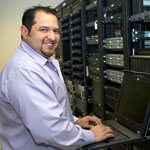Ricardo Acosta of Merck & Co. shares how his forward-thinking nature has kept him ahead of the technology curve throughout the years
1983-1990 Though the age of mainstream computers was just beginning, Ricardo Acosta knew he wanted to be involved with the evolving technology industry. Accepted to the prestigious Massachusetts Institute of Technology (MIT), Acosta studied electrical engineering and learned how to design and build computers in the classroom while working part-time designing software. “At the time, I didn’t fully understand the importance of what I was studying, or where the technology would go,” Acosta remembers.
After graduating in 1987, Acosta returned home to Puerto Rico and faced a job market burdened by recession. After being unemployed for several months, he took a contract position as a telephone-company engineer. “The situation was a good learning experience because I gained an appreciation for the security of a steady job with a large, established company,” he says. Looking to put his formal education to use, Acosta soon transitioned to a position as an engineer with a small computer networks company and, from there, jumped quickly to an IT consulting company, which worked with Eli Lilly and Company, where he gained his first exposure to the global pharmaceuticals industry.
1990-2001 Acosta found multinational companies a good fit for his professional goals, so in 1990, he made the move to Procter & Gamble (P&G) as an IT systems analyst. In 1995, Acosta relocated to South America, where he spent much of his time traveling around the continent and, during his tenure, he experienced IT’s role becoming significantly more important. He also lived out the Y2K experience, playing a large role in managing the risk of transitioning to the new millennium, and he saw the Internet come into play as a business tool. “In my last few years at P&G, I was heavily involved in supporting the marketing division as we explored the potential of the Internet to reach consumers—it was a new technology creating a great amount of excitement,” Acosta says.
2001-2003 By early 2001, Acosta was married and expecting his first child, based in Venezuela, and facing the threat of career stagnation following a P&G restructure. Ready to return to Puerto Rico, he researched his options and found the “clear choice” was Johnson & Johnson (J&J). “My role as IT director at J&J opened up an entirely different focus to me—instead of using technology to market consumer products, my new role was using information technology to enhance the process of making and packaging pharmaceutical products,” Acosta notes. “A relatively recent innovation, this job opportunity created many learning experiences. In many ways, I’ve been lucky to have made career moves during interesting times of change in the technology field.”
2003-2012 Looking to assume more leadership responsibilities, Acosta made the jump in 2003 to Merck & Co., Inc., where he became director, Puerto Rico manufacturing operations IT. His initial role included oversight of the manufacturing IT systems for all area plants which, at the time, supplied more than 40 percent of the company’s sales. Acosta was soon promoted to senior director, manufacturing division America’s regional IT. “Drug manufacturing was becoming increasingly automated, and I was excited to drive an expanded role for IT,” he says.
In 2010, Acosta was offered another role—and yet another professional challenge—as he shifted focus from manufacturing to distribution and logistics when he became director of global supply chain logistics IT. “Now my role is to use technology to efficiently manage our distribution operations to service a global network of customers,” he says. “Professionally, it was the next step in the full circle of applying IT for the supply chain and manufacturing field.”
Today Acosta recently joined the nonprofit Foundation for Puerto Rico, lending his professional expertise to help increase economic opportunities for current and future generations. Founded by local entrepreneur and philanthropist Jon Borschow, the foundation’s mission is to help local companies grow in a global economy by giving them tools to better position themselves to export, create jobs, and weather future economic storms.
The foundation is currently sponsoring a project that pairs MIT graduate students with local companies, who apply to be part of a free consulting program. For four months, each company’s “team” assesses opportunities to grow their business beyond Puerto Rico, what changes are needed, and then provides detailed recommendations to the companies. “Though the first companies to go through the process are still implementing the recommendations, we’ve already seen some successes,” Acosta says. “The program gives these companies access to a high-caliber team of resources that otherwise they would never be able to engage.”

